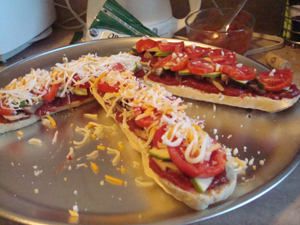 Food, glorious food!
Food, glorious food!
Hot sausage and mustard!
While we’re in the mood —
Cold jelly and custard!
– “Oliver”
Lately, I’ve been thinking a lot about food. OK, so that’s not news. I think about food a lot. What I’ve specifically been thinking about is a common way that Americans see their food, and it makes me sad.
As we’ve gotten wealthier and consequently fatter over time, Americans have come to see food as the enemy. We’re always discovering the evils that food contains, whether it’s fat, sugar, carbs, or calories (counting calories never goes out of style). Women in particular tend to talk about dieting, or how they “shouldn’t be eating” the chocolate cake that they’re about to dig into. It really takes the pleasure out of eating when you or those around you associate it with shame and lack of self-control.
I don’t completely blame us Americans for internalizing this attitude, because it’s all around us. Our friends proudly mention how their Diet Coke barely makes a dent in their Weight Watchers calorie allotment for the day. Everywhere in the media — on the newsstand, on TV, and in the movies — we see bodies with curves only in the “right” places, bodies of people who have access to personal trainers, chefs, plastic surgeons, and airbrushed photography. Restaurant menus now have “low carb” options and offer sweeteners like Splenda. Not surprisingly, these things eventually get to us. We get obsessed with being thin, and we go after getting thin without seeing the bigger picture.
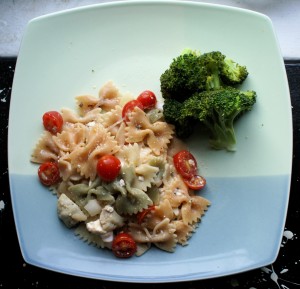 Personally, I’ve centered most of my activities for the day around food since I was little. I remember being six years old, showing up at day care right after breakfast, and asking the woman in charge, “What’s for lunch today?” Even though I live on a modest budget, I could never resort to eating Top Ramen every night, because eating is one of my greatest joys. I will always cut back on other luxuries before I cut back on my delicious meals.
Personally, I’ve centered most of my activities for the day around food since I was little. I remember being six years old, showing up at day care right after breakfast, and asking the woman in charge, “What’s for lunch today?” Even though I live on a modest budget, I could never resort to eating Top Ramen every night, because eating is one of my greatest joys. I will always cut back on other luxuries before I cut back on my delicious meals.
Even though I’ve remained around the same weight for most of my adult life, within the average range, there were a couple of times where I developed an unhealthy attitude toward eating. When I was 13, I became weight-conscious and decided that I wouldn’t eat any sugar for a year, or much fat at all. I became a vegetarian and exercised to an aerobic workout video like it was going out of style. I didn’t see much change in myself, except that I didn’t enjoy my food as much anymore.
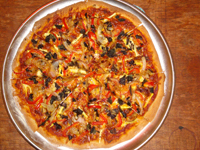 In 2005, when I went through some major relationship changes, I dropped ten pounds without meaning to, and then I gained around 15. My body felt lumpy, as if it didn’t belong to me anymore, and this made me hyper-sensitive to my food intake. I began to feel out of control. I’d frequently eat as a means to relieve stress, downing handfuls of chocolate chips, putting the bag back in the cabinet, and then going back several times for more. When I’d go to a potluck or catered event, I’d load up my plate to make sure I got to taste everything, as if there weren’t enough food to go around. At work, I’d snack throughout the day, mindlessly.
In 2005, when I went through some major relationship changes, I dropped ten pounds without meaning to, and then I gained around 15. My body felt lumpy, as if it didn’t belong to me anymore, and this made me hyper-sensitive to my food intake. I began to feel out of control. I’d frequently eat as a means to relieve stress, downing handfuls of chocolate chips, putting the bag back in the cabinet, and then going back several times for more. When I’d go to a potluck or catered event, I’d load up my plate to make sure I got to taste everything, as if there weren’t enough food to go around. At work, I’d snack throughout the day, mindlessly.
At some point, I realized that my body didn’t even know when it was full anymore. My life in general was out of balance, with too much work and not enough joy, and naturally my eating was out of balance, too. (Folks who eat foods containing high-fructose corn syrup are disrupting the leptin in their bodies, which tells the brain when it’s full and when to begin digestion.) Any diet I went on tackled the symptoms but not the cause, which was that I was unhappy and bouncing back between extremes in my life.
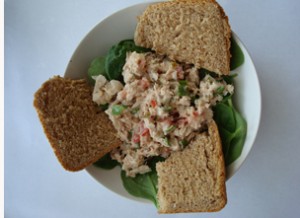 Like anything, getting back in balance with my eating required making small, permanent changes. I read the book French Women Don’t Get Fat: The Secret of Eating for Pleasure, which has been the single most influential book on me, ever. I learned to pay attention to two things: what I eat, and how I eat. I followed author Mireille Guiliano’s advice, based on the way French women eat, for both pleasure and nutrition above all. As a result, I found my body slowly finding its equilibrium again. Here are the principles I eat by:
Like anything, getting back in balance with my eating required making small, permanent changes. I read the book French Women Don’t Get Fat: The Secret of Eating for Pleasure, which has been the single most influential book on me, ever. I learned to pay attention to two things: what I eat, and how I eat. I followed author Mireille Guiliano’s advice, based on the way French women eat, for both pleasure and nutrition above all. As a result, I found my body slowly finding its equilibrium again. Here are the principles I eat by:
1) When my life is balanced, my eating is balanced.
If I take care of myself, my eating patterns are regular. It’s a natural result. I get enough sleep, which helps regulate the metabolism. I drink water throughout the day (not soda or even juice) and take regular yoga classes, both of which help put the body’s systems back in balance and keep them that way. I take walks when I can and insist on spending my time with people who make me laugh (distancing myself from the negative ones).
 2) Don’t listen to American diet fads. Eat as the Europeans have for centuries.
2) Don’t listen to American diet fads. Eat as the Europeans have for centuries.
I don’t eat things that were created in a laboratory, like sodas (especially diet), and I buy organic. I follow the traditions of cultures who are a lot happier and healthier as a whole than we are, and contrary to what some American dieticians would say, it hasn’t made me fat. Throwing caution about carbs to the wind, I bought a bread machine so I could have fresh, unprocessed bread every day. I eat it with full-fat butter or cream cheese, just enough to make it taste good. I eat whole milk yogurt (great for digestion), use whole milk when I cook (I don’t drink it, because I don’t like it plain), and sautee vegetables in olive oil. I buy whole foods and avoid anything processed into a nonfat or lowfat version that nature didn’t intend.
3) Enjoy your food. It is your ally, and not your enemy.
Food nurtures us and keeps us alive and well. It also is the source of pleasure and connection among people. Take time to taste your food, to identify the flavors and ingredients in it. Remember that, as Guiliano says, the most pleasure is in the first few bites. Remember also how lucky you are to have access to an abundance of safe and healthy food.
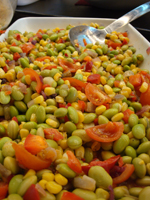 4) Eat for nutrition and variety.
4) Eat for nutrition and variety.
Eat foods with a lot of nutrients, not ones with empty calories like chips and candy. Try new foods (vegetables, spices, etc.) every time you go to the market. Eat with the seasons, and try to eat as many colors of fruits and vegetables as you can. Different colors signify different nutrients.
5) Listen to your body. Eat what you feel like eating, slowly, and stop when you’re full.
I try to eat slowly and savor my food, not because I want to limit my calorie intake, but because it tastes so darn good and I want to make it last. I remember the saying, “There are no tastebuds in your stomach.” A side benefit is that this way, my body has time to tell me when it’s full, and then I stop eating. If I eat too much, I feel sick afterward, which cancels out the pleasure of eating. If my body doesn’t want dessert, I don’t eat dessert, but if I feel like it, I eat it. To develop my intuition, I check in with myself frequently, and not just about eating, e.g. “How am I feeling right now?” “Do I need anything?”
6) Enjoy small doses of sweets, snacks, alcohol, etc. when you crave them.
I eat meat when I’m craving it, which isn’t very often, and the occasional beer and wine. I don’t keep sweets around the house except for high-quality dark chocolate, and I don’t snack much except for fruit or toast if I get hungry between meals.
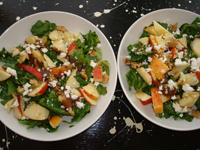 7) Cook for yourself as much as possible.
7) Cook for yourself as much as possible.
When you eat at a restaurant, you don’t know exactly what’s in your food, and you don’t build the same connection with the food as you do when you prepare it yourself. American portion sizes tend to be large, and because the objective of a chef is to make the food taste good, it may have excesses of ingredients like butter, salt, and sugar. If you’re short on time, you can cook on weekends and freeze meal-sized portions of what you cook, to eat during the week. Bring your lunch to work if you can.
8 ) Don’t deprive yourself.
If you need a snack, have one; just make it healthy and enough to satisfy your craving. Split a dessert with a friend. If you simply can’t give up Dr. Pepper, get a small one occasionally at a restaurant instead of keeping it on hand. If you feel hungry all the time, consider that you might be craving water or relaxation rather than food.
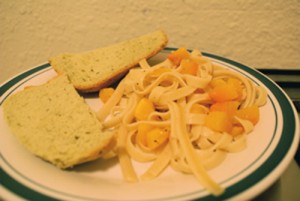 9) Don’t make a big deal out of eating.
9) Don’t make a big deal out of eating.
Don’t make jokes about cake being “fat-free” when it obviously isn’t, or calories not counting on your birthday. Don’t diet. Eating is a pleasurable part of life, not something to feel guilty about. If you lose your equilibrium and overeat, try to eat extra healthily for the next couple of days.
10) Read French Women Don’t Get Fat (buy it through the links on this page if you’re going to order through Amazon, who will give RSY a percentage!). Be patient with yourself as your body finds its balance. Focus your energies not on limiting your eating, but on finding balance in your life. And remember, above all, that food is glorious.
My foodie friends and I keep a food blog, Feed the Empire, where we share our favorite recipes and the stories that go with them. A few of the pictures above link to recipes.
Well said! I really love French Women Don’t Get Fat – such a good message about embracing and enjoying food.
I sometimes feel that you live inside my head. Get out!
I struggle with having a good attitude toward food as well. It’s hard to get rid of some of the guilt Americans often associate with eating, but “French Women Don’t Get Fat” definitely has valuable lessons and living in France made me get more in touch with that mentality. Eat fresh, unprocessed foods; enjoy little indulgences like pain au chocolat or cake on occasion; make meals a leisurely and communal experience. I certainly do the emotional eating thing as well, and I’m trying to be more aware of it and try to change my behavior without beating myself up about it all the time.
Have you read “In Defense of Food” yet? I’m only halfway through, but it’s so fascinating.
Ha, I know what you mean, Gill. We laugh alike, we walk alike, sometimes we even talk alike….
Definitely, the social aspect of eating is so important and helps us slow down. I liked how the author talks about using real plates and not eating standing up or while in motion, but rather giving the proper attention to eating. And the little indulgences (say, one cookie instead of five) are what make life worthwhile.
No, I haven’t even finished “The Omnivore’s Dilemma” yet! I have “In Defense of Food” and “Real Food” sitting on my shelf. I intend to make more time to read real books.
I agree with your message about laying off the diet soda and avoiding things made in a lab. I was addicted to Diet Coke even though I knew it was bad for me. Thiswas one of the reason I co-founded Zevia. Zevia is a 0 calorie diet soda without aspartame, Splenda or anything artificial. If you would like samples to try and possible review please email me at ian at zevia dot com. BTW IMHO it tastes WAY better then Diet Coke. We also make orange, twist, ginger root beer, black cherry and ginger ale.
I can’t say I support the real plates point, because that necessitates more dishwashing.
BUT I enthusiastically support everything else. Since January 2008 I’ve lost about 25 lbs, not through a drastic diet, but by switching to all natural foods, lots of organic fruits & vegetables, and not having meat in every meal. The biggest shift I made was (with Melia’s help) noticing all of the nasty supplements, chemicals, additives and preservatives that are in so many supermarket foods. Once I started seeing that stuff as not ‘food,’ it became a lot easier to focus on eating things that are natural. I’ve never felt better, and without even trying, the pounds have melted off.
Ian, the natural soda looks awesome, the first that I’ve seen sweetened with stevia. I like how you break down what the ingredients are and where they come from. I’ve never been into soda myself, but it sounds like a good product that’ll help people wean themselves from unnatural sodas.
Reading the ingredients is a big step forward. The list should be short and pronounceable (those Breyers commercials with the kids reading the labels were great). And if bread can sit there for two weeks without getting moldy, you know there are preservatives in it, because that’s just not natural. You have no idea what these things are doing to your body and its metabolism.
Such a great reminder – I’m such a Europhile to begin with, but it’s true, they’ve got it right (at least before the McD’s invasion).
I’m with you — I love the European ways. Full fat everything, not too much of anything, lots of walking. Cook, enjoy, repeat. I love your food blog. Those Chocolate and PB Chip Oatmeal Cookies are making my mouth water.